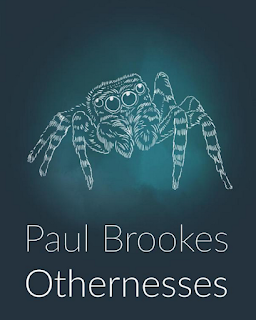Review - Paul Brookes - These Random Acts of Wildness / Othernesses
Paul Brookes is a writer, local historian, genealogist, photographer, shop assistant and grandfather. He is editor of the Wombwell Rainbow interviews, reviews and poetic challenges, and has many published poems and several chapbooks. For more, go to www.thewombwellrainbow.com.
--------------------------------------------------------------------------------------------------------
Paul has published these two books of poetry simultaneously. They are a result of writing a sonnet a day, inspired to do so by fellow Barnsley poet Ian MacMillan. Sonnets are not straightforward, but they sit nicely in the Venn diagram of narrative, lyric and imagistic and, when used skilfully, can be a powerful weapon in the poet's arsenal. You can tell a story, but it can't ramble. It can be all imagistic, or employ images within it. It can be used as a snapshot that encapsulates an idea. In these publications we see how Paul uses this form in multiple ways.
I am reviewing these together (at Paul's request) as they are linked. I will begin with "These Random Acts of Wildness", a set of 38 poems that are grouped by mini-themes. Nature, housework, childhood and school, and observations in a churchyard. The last group, each describing the life of people randomly next to each other in the graveyard, are a conclusion of the theme of death that runs through the other sections and is signalled by the angel statue beautifully illustrated by Jane Cornwell on the front cover. Randomness is a theme too, and as humans our desperate attempts to find some sort of order to the chaos of the world.
There are many excellent poems here - I like "Cemetery Swallows" - a poem about life and death intertwining and life continuing after we go.
Flash their white underside as they curl in
wards, vital boomerangs spinning back on
themselves, snatch flitting small meals in a spin
I identify very much with Paul's memories of schooldays in a working class area where being clever and shy made you an outsider.
Our parents want, work towards best for us.
We are separate in distinctiveness.
The descriptions of the mundane are very good, inhabiting the soul of the vacuum cleaner and iron, observing nature at a microscopic level.
This is a fabulous collection that requires, and deserves, multiple readings. It uses plain language, including dialect where needed, but also stretches into difficult and complex images.
Othernesses is a companian piece that is published by, and contains, beautiful drawings by Jane Cornwell. The combination of sonnets and art is terrific and adds to what is a superb collection of poems. Many of them are about insects, or sea life, and introduce us, briefly, to the brief lives of these creatures that share our planet. Despite being all around us, they are strange, they are "other". We don't really understand how they think, or what drives them other than some nebulous concept of "instinct". We, as supposed higher beings, are always thinking about everything and believe we make most of our decisions after considered thought. Perhaps this collections suggests we don't - viewed on a larger scale our lives are brief. We search for food, sex, perhaps some kind of fulfilment, and then we die.
'Earwigs' is a good example - it shows the birth, upbringing and eventual leaving of the nest of this familiar insect (or is it familiar? - when was the last time I saw one? I used to see them all the time as a boy. Maybe I've stopped looking.) It refers to the female as "Mam", which is a great way to draw you into the poem.
We crawl out of our eggs and eat them
Mam guards us against those who would eat us,
feeds us what she's caught or found, dead stems,
hard and soft shelled, rotted out of darkness.
As a side note, this stanza shows us the effort Paul puts into his rhymes - this is a pattern throughout the book. The mix of full and half rhymes keeps the poems from sounding the same.
This mother is cruel - she will kill and eat any young who don't leave so she can move on to the next brood. While this is extreme, there will be people who recognise this rejection if their mother finds a new man, a new family.
Even home is temporary. All fleet.
I hide in darkness, wings folded and neat.
Someone asked the other day to define poetry as opposed to just speaking or writing. This book would be a fantastic example. I replied as a quick and incomplete response - "rhythm, concise language, pointing out things that people may not otherwise see, but recognise."
Just when you think Paul has created a complete collection of insect sonnets like some Victorian collector, pinning them one at a time onto a board, he throws in some poems about him, his ancestors, and indeed ourselves.
There are about 70 sonnets in "Othernesses" so it takes time and multiple readings to absorb them all. Along with "These Random Acts of Wildness" they form a formidable collection of beautifully constructed fourteen liners (one or two may be shorter!). Vivid, detailed, and interesting. Get them both if you can.
"These Random Acts of Wildness" is published by Glass Head Press and is available directly from the author. Contact Paul on Twitter @PaulDragonWolf1 or by email paulbrookes07@gmail.com
"Othernesses" is published by Jane's Studio Press



No comments:
Post a Comment